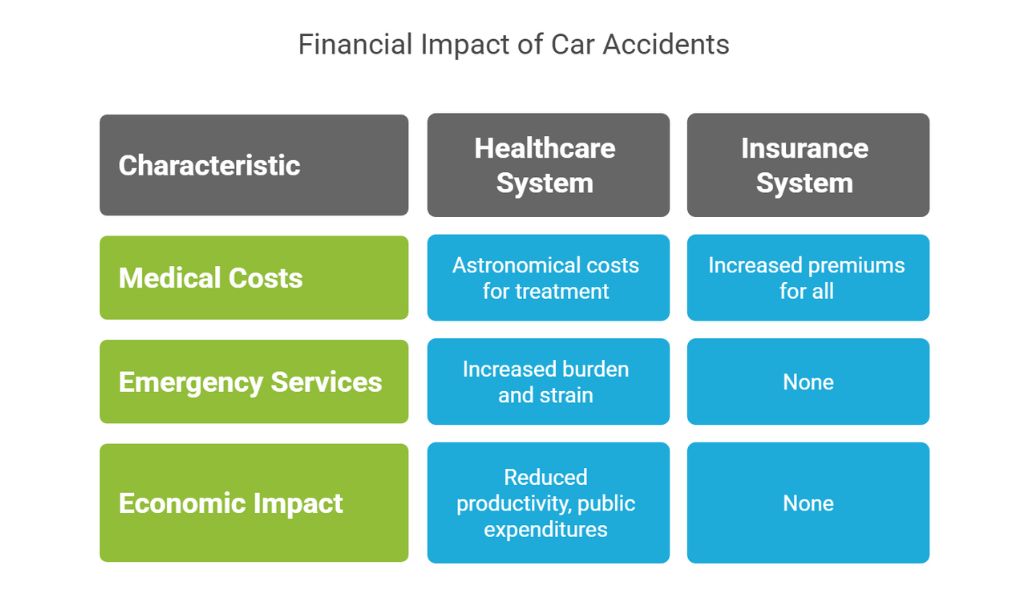Have you ever considered the actual cost of a car accident? Beyond the immediate trauma and vehicle damage, the economic ripple effects can be staggering. As you navigate busy roads each day, you’re participating in a complex system with profound financial implications. Whether looking for the best car accident lawyer long island, this article will examine the economics of car accidents from multiple angles, revealing the often-overlooked costs to individuals, insurance companies, healthcare systems, and society as a whole.
The Direct Costs of Car Accidents
Car accidents can have a devastating financial impact on individuals and families. The immediate expenses often include medical bills, which can quickly skyrocket for severe injuries requiring hospitalization or long-term care. Vehicle repair or replacement costs are another significant burden, potentially leaving you without transportation.
Additionally, you may face lost wages due to time off work for recovery or medical appointments. Legal fees can also accumulate if litigation becomes necessary. Insurance premiums often increase following an accident, resulting in a lasting financial burden. These direct costs can easily amount to tens of thousands of dollars, potentially derailing your financial stability and plans.
Indirect Costs: Lost Productivity and Quality of Life
Car accidents don’t just impact your wallet directly; they can have far-reaching consequences on your productivity and overall quality of life. When you’re injured in a crash, you may face extended time away from work, leading to lost wages and potential career setbacks. Even minor accidents can result in missed deadlines or reduced efficiency due to stress and logistical challenges.
Beyond the workplace, accidents can strain personal relationships and limit your ability to enjoy leisure activities. The psychological toll of a traumatic incident shouldn’t be underestimated either, as anxiety or PTSD can linger long after physical wounds have healed. These indirect costs, while harder to quantify, often surpass the immediate financial burden of an accident.
The Economic Burden on Healthcare and Insurance Systems
The financial impact of car accidents extends far beyond individual losses, placing significant strain on healthcare and insurance systems. Medical costs for treating accident victims can be astronomical, with severe injuries often requiring long-term care and rehabilitation. This surge in healthcare demand drives up insurance premiums for everyone, as providers struggle to strike a balance between risk and profitability.
Additionally, the burden on emergency services and trauma centers increases, potentially affecting their ability to respond to other medical emergencies. The ripple effect of these costs can lead to broader economic consequences, including reduced productivity and increased public healthcare expenditures, ultimately impacting society as a whole.
The Macroeconomic Impact of Car Accidents
Car accidents have far-reaching economic consequences that extend beyond individual costs. On a national scale, these incidents result in substantial productivity losses as injured workers take time off or leave the workforce entirely.
Healthcare systems are facing increased strain, with accident-related treatments consuming a significant amount of resources. Insurance premiums rise across the board as companies offset their payouts, affecting even the most responsible drivers. Additionally, traffic congestion resulting from accidents causes widespread economic inefficiencies, impacting supply chains and commerce.
Public infrastructure also bears a heavy burden, with repairs and safety improvements draining government budgets. Collectively, these factors can slow economic growth and divert funds from other crucial sectors, underscoring the need for comprehensive road safety measures.
Strategies to Reduce the Financial Toll of Automotive Crashes
To mitigate the economic impact of car accidents, consider implementing proactive measures to address this issue. Invest in comprehensive auto insurance that includes collision and liability coverage to protect against unexpected expenses and financial losses.
Regular vehicle maintenance can prevent mechanical failures that lead to accidents. Defensive driving courses not only enhance safety skills but may also qualify you for insurance discounts. Utilize advanced driver assistance systems [ADAS] in newer vehicles, which can significantly reduce accident risk.
Additionally, supporting initiatives for improved road infrastructure and stricter enforcement of traffic laws can contribute to a reduction in overall accidents, benefiting both individuals and society financially in the long run.
Final Thoughts
As you’ve seen, car accidents have far-reaching economic consequences that extend well beyond the individuals directly involved. The financial ripple effects impact insurance rates, healthcare costs, lost productivity, and public infrastructure spending. Whether looking for the best car accident lawyer long island, by understanding these complex economic factors, you can better comprehend the actual societal costs associated with traffic collisions. Moving forward, it’s crucial to support policies and technologies that improve road safety and mitigate accident-related expenses.




































